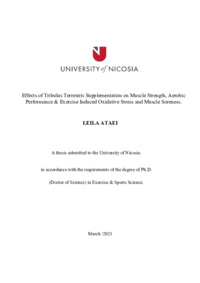- Ataei, Leila
- School of Humanities and Social Sciences
- Department of Social Sciences
- September 2021
- English
- 113 pages
- Aphamis, George | Giannaki, Christoforos | Petrou, Christos
- Tribulus-Terrestris | Testosterone | Βody Composition | Isometric Torque | Aerobic Exercise | Forced Sedentarism | Exercise-Induced Muscle Soreness | Delayed Onset of Muscle Soreness | Inflammatory Responses | Oxidative Stress
- Life and Health Science
-
-
Despite several positive effects of exercise and physical activity on health, high-intensity physical exercises (>60% of maximal oxygen uptake) can provoke oxidative stress due to the generation of reactive oxygen species by enhanced oxygen consumption. On the other hand, de-conditioning of athletes, due to restricted habitual physical activity may reverse previous exercise adaptations, depending on the detraining period, which can result in a reduction of muscle capillarization and fiber cross-sectional area resulting in decreased force output and resistance to fatigue. Thus, athletes seek a safe and effective strategy or interventions to maintain lean body mass and strength during the inactivity period and speed up the recovery period.
Tribulus Terrestris L. (TT) is a herbal nutritional supplement that has been traditionally used as an alternative medicine to treat diseases related to inflammation or oxidative stress. TT is also believed to raise the level of testosterone by stimulating the leutinizing hormone (LH). Therefore, its use has recently become popular among athletes in order to improve lean muscle mass, physical performance, and maximum oxygen uptake.
This thesis reports on two studies investigating the effect of 4-weeks of TT supplementation on
1) Testosterone levels, body composition, muscle strength, and aerobic performance.
2) Exercise-induced oxidative damage and delayed onset muscle soreness.The first study, aimed to determine the potential ergogenic effects of TT in preventing the loss of body muscle and strength or its effects on aerobic performance, following a period of inactivity of 13 university-based sportsmen who participated in this randomized, double-blind, crossover study.
Participants received either a daily oral TT or Placebo (PL) for 4 weeks with a 2-week wash-out period between the trials. Body composition, isometric torque, VO2max, and time trial exercise test to exhaustion were assessed. Blood lactate was measured twice before and after the exercise test, and blood samples also were collected to determine testosterone levels before and after exercise (2&24h).
The results showed, whilst testosterone concentration at rest decreased in the placebo trial over the 4-week intervention period, supplementation with TT, maintained the resting testosterone levels. Additionally, TT supplementation increased the 2h post-exercise levels of the hormone, but did not affect body composition or aerobic performance, and muscle strength.
In conclusion, 4 weeks of TT supplementation had no ergogenic effect on aerobic performance or muscle strength loss, following a significant reduction in the training regimes' intensity and volume.
The second study established a randomized, double-blind, crossover design to identify whether TT can attenuate oxidative stress and inflammatory responses to acute aerobic exercise and improve DOMS in 13 healthy men following a 4-week supplementation with TT or PL. Participant DOMS, thigh girth (TG), and knee range of motion (KRJM) were assessed prior to and after the exercise tests (2, 24 & 48 h). Blood samples were collected before and after exercise (2, 24 & 48 hrs) to analyze reduced and oxidized glutathione, protein carbonyls, total antioxidant capacity, creatine kinase activity, white blood cell count, and thiobarbituric acid reactive substances.
The results showed that acute exercise tests to exhaustion, induced inflammatory responses and changed both TT and PL groups' blood redox status. Although TT significantly modified the blood redox status and inflammatory biomarkers alteration after the acute exercise, it failed to support TT's effect to improve DOMS, TG, or KRJM.
In conclusion, the effect of TT on inflammation may be through a pathway that is independent of muscle soreness.
-
Effects of Tribulus Terrestris Supplementation on Muscle Strength, Aerobic Performance & Exercise Induced Oxidative Stress and Muscle Soreness.
| Type | Location | Link |
|---|---|---|
| dissertation | [More information] |

